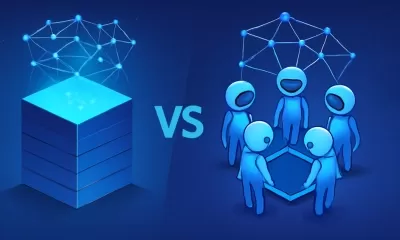AI Agents vs Large Models: Teamwork Outperforms Bigger Systems Alone

The era of ever-growing language models may be reaching an inflection point. While scaling up LLMs has delivered impressive capabilities, from technical writing to creative storytelling, the paradigm is shifting toward more sustainable and efficient approaches.
Problems with Large Models
The Hidden Costs of Scaling Up
The exponential growth of LLMs comes with significant drawbacks. Beyond just financial expenses, the environmental impact of massive computing resources raises pressing sustainability questions. These behemoth models guzzle electricity comparable to small towns during training.
Performance Plateaus
Contrary to initial hopes, throwing more resources at models doesn't guarantee better results. Research reveals an efficiency ceiling where additional parameters yield minimal improvements while costs continue soaring. Some compact models now demonstrate that quality training data often trumps sheer model size.
Reliability Concerns
Persistent issues plague even the most advanced LLMs. Their opaque decision-making processes and tendency toward inaccurate outputs ("hallucinations") make them concerning choices for high-stakes applications. Without transparency into their inner workings, verifying outputs becomes particularly challenging.
Data Scarcity Ahead
The data pipeline sustaining these models shows worrisome cracks. With potential limitations on publicly available training data and increasing privacy regulations, the fundamental fuel for ever-larger models may soon run dry.
Understanding AI Agents
Beyond Text Generation
Today's specialized agents represent a fundamental evolution from basic LLMs. These dynamic systems don't just respond to prompts - they actively perceive, analyze, and interact with their digital environments through continuous feedback loops.
Key Differentiation Factors
- Purposeful Autonomy: Agents operate independently toward defined objectives
- Contextual Adaptability: They adjust approaches based on changing conditions
- Tool Integration: Agents connect with external systems to gather data and take action
- Evolving Memory: Experience informs future decisions through sophisticated recall
- Strategic Reasoning: Advanced planning replaces simple pattern recognition
Why Teams Work Better Than Single Agents
The Synergy Advantage
Multi-agent systems mirror high-performing organizations where specialists complement each other's strengths. This division of labor enables both focused expertise and system resilience - if one component fails, others maintain functionality.
Key System Benefits
- Specialization creates deep expertise in each domain
- Modular design allows flexible scaling
- Distributed intelligence prevents single points of failure
- Collaborative problem-solving yields innovative solutions
- Adaptive capacity responds to evolving challenges
Coordination Frameworks
Effective team-based AI requires communication protocols comparable to human organizations. Researchers are developing:
- Peer-to-peer information networks
- Centralized oversight systems
- Hybrid organizational structures
- Conflict resolution mechanisms
Challenges and Future Opportunities
Operational Complexity
Managing multi-agent systems presents novel challenges in organizational design and resource allocation. Teams must balance:
- Computational efficiency versus coordination needs
- Distributed autonomy versus system coherence
- Scalability versus specialization depth
Emerging Solutions
The field is addressing these issues through:
- Self-optimizing agent architectures
- Dynamic load balancing techniques
- Adaptive reasoning frameworks
- Predictive coordination algorithms
The Bottom Line
The AI revolution is entering its next phase - moving beyond brute-force scaling toward intelligent cooperation. Team-based systems promise:
- Sustainable computing footprints
- Specialized problem-solving
- Reliable distributed intelligence
- Practical real-world adaptability
As research addresses current coordination challenges, this collaborative paradigm may define AI's most impactful evolution yet - where collective artificial intelligence achieves what no single model could.
Related article
 Google Launches Project Mariner, Its AI-Powered Web Browsing Agent
Google's Project Mariner AI Agent Expands with Major UpgradesAt Google I/O 2025, the tech giant announced significant updates to Project Mariner, its experimental AI agent designed to browse and interact with websites on behalf of users. Now available to more testers and developers, the revamped ver
Google Launches Project Mariner, Its AI-Powered Web Browsing Agent
Google's Project Mariner AI Agent Expands with Major UpgradesAt Google I/O 2025, the tech giant announced significant updates to Project Mariner, its experimental AI agent designed to browse and interact with websites on behalf of users. Now available to more testers and developers, the revamped ver
 Airbnb is quietly rolling out an AI customer service bot in the US
Airbnb Takes AI-Powered Customer Service to New Heights
Last month, during Airbnb’s first-quarter earnings call, CEO Brian Chesky announced that the company had begun rolling out an AI-powered customer service bot in the U.S. It’s been quite the journey since last year when Airbnb revealed it was te
Airbnb is quietly rolling out an AI customer service bot in the US
Airbnb Takes AI-Powered Customer Service to New Heights
Last month, during Airbnb’s first-quarter earnings call, CEO Brian Chesky announced that the company had begun rolling out an AI-powered customer service bot in the U.S. It’s been quite the journey since last year when Airbnb revealed it was te
 Manny Medina's New Venture: Enabling AI Agents to Earn Income
As the era of AI agents unfolds, a new trend is gaining traction: startups are emerging to provide the essential tools that help businesses create and manage a workforce of bots. Manny Medina, renowned for founding and formerly leading Outreach, a sales automation company valued at $4.4 billion, has
Comments (0)
0/200
Manny Medina's New Venture: Enabling AI Agents to Earn Income
As the era of AI agents unfolds, a new trend is gaining traction: startups are emerging to provide the essential tools that help businesses create and manage a workforce of bots. Manny Medina, renowned for founding and formerly leading Outreach, a sales automation company valued at $4.4 billion, has
Comments (0)
0/200

The era of ever-growing language models may be reaching an inflection point. While scaling up LLMs has delivered impressive capabilities, from technical writing to creative storytelling, the paradigm is shifting toward more sustainable and efficient approaches.
Problems with Large Models
The Hidden Costs of Scaling Up
The exponential growth of LLMs comes with significant drawbacks. Beyond just financial expenses, the environmental impact of massive computing resources raises pressing sustainability questions. These behemoth models guzzle electricity comparable to small towns during training.
Performance Plateaus
Contrary to initial hopes, throwing more resources at models doesn't guarantee better results. Research reveals an efficiency ceiling where additional parameters yield minimal improvements while costs continue soaring. Some compact models now demonstrate that quality training data often trumps sheer model size.
Reliability Concerns
Persistent issues plague even the most advanced LLMs. Their opaque decision-making processes and tendency toward inaccurate outputs ("hallucinations") make them concerning choices for high-stakes applications. Without transparency into their inner workings, verifying outputs becomes particularly challenging.
Data Scarcity Ahead
The data pipeline sustaining these models shows worrisome cracks. With potential limitations on publicly available training data and increasing privacy regulations, the fundamental fuel for ever-larger models may soon run dry.
Understanding AI Agents
Beyond Text Generation
Today's specialized agents represent a fundamental evolution from basic LLMs. These dynamic systems don't just respond to prompts - they actively perceive, analyze, and interact with their digital environments through continuous feedback loops.
Key Differentiation Factors
- Purposeful Autonomy: Agents operate independently toward defined objectives
- Contextual Adaptability: They adjust approaches based on changing conditions
- Tool Integration: Agents connect with external systems to gather data and take action
- Evolving Memory: Experience informs future decisions through sophisticated recall
- Strategic Reasoning: Advanced planning replaces simple pattern recognition
Why Teams Work Better Than Single Agents
The Synergy Advantage
Multi-agent systems mirror high-performing organizations where specialists complement each other's strengths. This division of labor enables both focused expertise and system resilience - if one component fails, others maintain functionality.
Key System Benefits
- Specialization creates deep expertise in each domain
- Modular design allows flexible scaling
- Distributed intelligence prevents single points of failure
- Collaborative problem-solving yields innovative solutions
- Adaptive capacity responds to evolving challenges
Coordination Frameworks
Effective team-based AI requires communication protocols comparable to human organizations. Researchers are developing:
- Peer-to-peer information networks
- Centralized oversight systems
- Hybrid organizational structures
- Conflict resolution mechanisms
Challenges and Future Opportunities
Operational Complexity
Managing multi-agent systems presents novel challenges in organizational design and resource allocation. Teams must balance:
- Computational efficiency versus coordination needs
- Distributed autonomy versus system coherence
- Scalability versus specialization depth
Emerging Solutions
The field is addressing these issues through:
- Self-optimizing agent architectures
- Dynamic load balancing techniques
- Adaptive reasoning frameworks
- Predictive coordination algorithms
The Bottom Line
The AI revolution is entering its next phase - moving beyond brute-force scaling toward intelligent cooperation. Team-based systems promise:
- Sustainable computing footprints
- Specialized problem-solving
- Reliable distributed intelligence
- Practical real-world adaptability
As research addresses current coordination challenges, this collaborative paradigm may define AI's most impactful evolution yet - where collective artificial intelligence achieves what no single model could.
 Google Launches Project Mariner, Its AI-Powered Web Browsing Agent
Google's Project Mariner AI Agent Expands with Major UpgradesAt Google I/O 2025, the tech giant announced significant updates to Project Mariner, its experimental AI agent designed to browse and interact with websites on behalf of users. Now available to more testers and developers, the revamped ver
Google Launches Project Mariner, Its AI-Powered Web Browsing Agent
Google's Project Mariner AI Agent Expands with Major UpgradesAt Google I/O 2025, the tech giant announced significant updates to Project Mariner, its experimental AI agent designed to browse and interact with websites on behalf of users. Now available to more testers and developers, the revamped ver
 Airbnb is quietly rolling out an AI customer service bot in the US
Airbnb Takes AI-Powered Customer Service to New Heights
Last month, during Airbnb’s first-quarter earnings call, CEO Brian Chesky announced that the company had begun rolling out an AI-powered customer service bot in the U.S. It’s been quite the journey since last year when Airbnb revealed it was te
Airbnb is quietly rolling out an AI customer service bot in the US
Airbnb Takes AI-Powered Customer Service to New Heights
Last month, during Airbnb’s first-quarter earnings call, CEO Brian Chesky announced that the company had begun rolling out an AI-powered customer service bot in the U.S. It’s been quite the journey since last year when Airbnb revealed it was te
 Manny Medina's New Venture: Enabling AI Agents to Earn Income
As the era of AI agents unfolds, a new trend is gaining traction: startups are emerging to provide the essential tools that help businesses create and manage a workforce of bots. Manny Medina, renowned for founding and formerly leading Outreach, a sales automation company valued at $4.4 billion, has
Manny Medina's New Venture: Enabling AI Agents to Earn Income
As the era of AI agents unfolds, a new trend is gaining traction: startups are emerging to provide the essential tools that help businesses create and manage a workforce of bots. Manny Medina, renowned for founding and formerly leading Outreach, a sales automation company valued at $4.4 billion, has





























